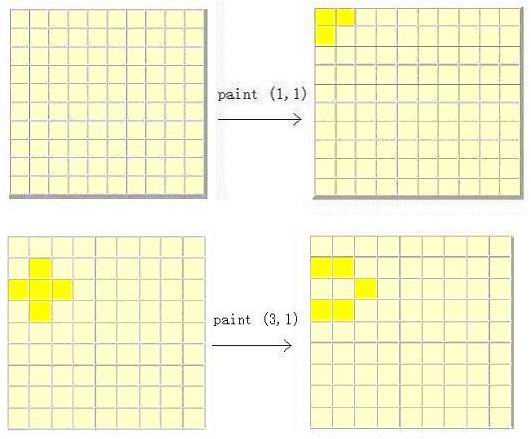Description
There is a square wall which is made of n*n small square bricks. Some bricks are white while some bricks are yellow. Bob is a painter and he wants to paint all the bricks yellow. But there is something wrong with Bob's brush. Once he uses this brush to paint brick (i, j), the bricks at (i, j), (i-1, j), (i+1, j), (i, j-1) and (i, j+1) all change their color. Your task is to find the minimum number of bricks Bob should paint in order to make all the bricks yellow.


Input
The first line contains a single integer t (1 <= t <= 20) that indicates the number of test cases. Then follow the t cases. Each test case begins with a line contains an integer n (1 <= n <= 15), representing the size of wall. The next n lines represent the original wall. Each line contains n characters. The j-th character of the i-th line figures out the color of brick at position (i, j). We use a 'w' to express a white brick while a 'y' to express a yellow brick.
Output
For each case, output a line contains the minimum number of bricks Bob should paint. If Bob can't paint all the bricks yellow, print 'inf'.
Sample Input
2 3 yyy yyy yyy 5 wwwww wwwww wwwww wwwww wwwww
Sample Output
0 15
Source
题意:
一个n*n 的木板 ,每个格子 都 可以 染成 白色和黄色,( 一旦我们对也个格子染色 ,他的上下左右 都将改变颜色);
给定一个初始状态 , 求将 所有的 格子 染成黄色 最少需要染几次? 若 不能 染成 输出 inf。
思路:高斯消元法,可以参照poj1222,只是要判断是否无解;
代码:
#include<cstdio>
#include<cstring>
#include<algorithm>
#include<cmath>
using namespace std;
const int N=15;
char map[N][N];
int a[N*N][N*N+N];
int x[N*N];
void init(int n)
{
memset(a,0,sizeof(a));
for(int i=0;i<n;i++)
for(int j=0;j<n;j++)
{
int t=i*n+j;
a[t][t]=1;
if(i>0) a[(i-1)*n+j][t]=1;
if(i<n-1) a[(i+1)*n+j][t]=1;
if(j>0) a[i*n+j-1][t]=1;
if(j<n-1) a[i*n+j+1][t]=1;
}
}
int Gauss(int n)
{
int col=0;
int k;
for(k=0;k<n,col<n;k++,col++)
{
int max_r=k;
for(int i=k+1;i<n;i++)
if(abs(a[max_r][col])<abs(a[i][col]))
max_r=i;
if(max_r!=k)
for(int i=col;i<=n;i++)
swap(a[max_r][i],a[k][i]);
if(a[k][col]==0)
{
k--;continue;
}
for(int i=k+1;i<n;i++)
{
if(a[i][col])
for(int j=col;j<=n;j++)
a[i][j]^=a[k][j];
}
}
for(int i=k;i<n;i++)
if(a[i][n]!=0) return -1;
for(int i=n-1;i>=0;i--)
{
x[i]=a[i][n];
for(int j=i+1;j<=n;j++)
x[i]^=(x[j]&&a[i][j]);
}
return 0;
}
int main()
{
int t;
scanf("%d",&t);
while(t--)
{
int n;
scanf("%d",&n);
for(int i=0;i<n;i++)
scanf("%s",map[i]);
init(n);
for(int i=0;i<n;i++)
for(int j=0;j<n;j++)
if(map[i][j]=='y')
a[i*n+j][n*n]=0;
else
a[i*n+j][n*n]=1;
memset(x,0,sizeof(x));
int ans=Gauss(n*n);
if(ans==-1)
printf("inf\n");
else
{
for(int i=0;i<n*n;i++)
if(x[i]==1) ans++;
printf("%d\n",ans);
}
}
}





 探讨了在一个n*n的方格中,通过改变特定格子及其相邻格子的颜色来将所有白色格子变为黄色所需的最少操作次数。采用高斯消元法解决此问题。
探讨了在一个n*n的方格中,通过改变特定格子及其相邻格子的颜色来将所有白色格子变为黄色所需的最少操作次数。采用高斯消元法解决此问题。
















 659
659

 被折叠的 条评论
为什么被折叠?
被折叠的 条评论
为什么被折叠?








